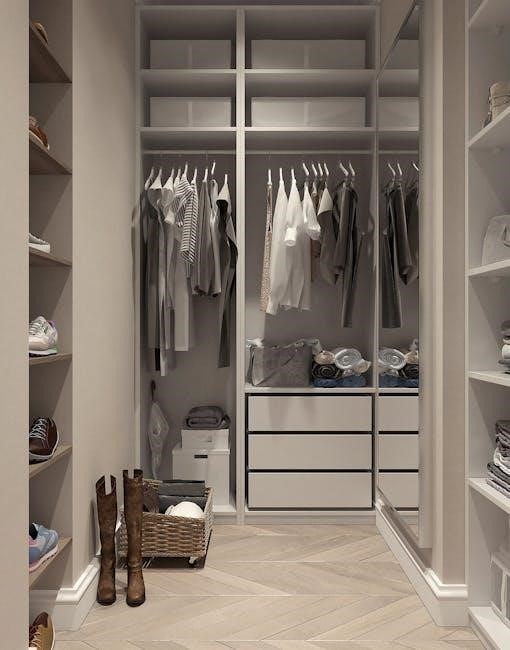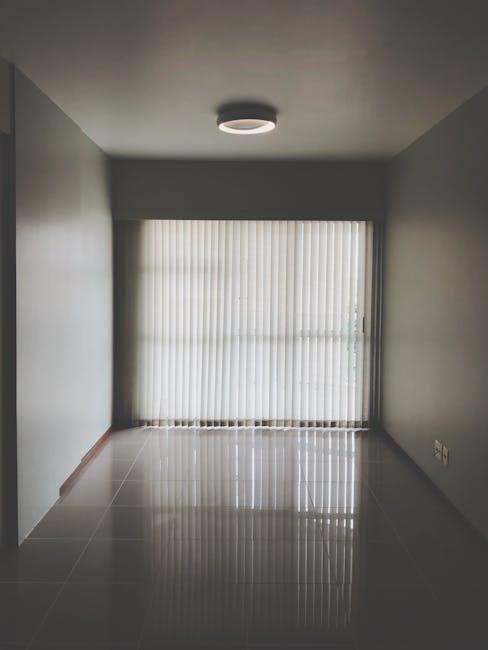Sarah Ruhl’s The Clean House is a fresh‚ funny romantic comedy that explores themes of cleanliness‚ identity‚ and love. Available as a PDF‚ it blends humor with emotional depth‚ offering a unique perspective on modern relationships and self-discovery.
1;1 Overview of the Play
The Clean House by Sarah Ruhl is a captivating blend of comedy and drama that delves into themes of identity‚ relationships‚ and the pursuit of meaning. The play centers around Ana‚ a Brazilian maid‚ and her complex interactions with her employer‚ Matilde‚ a surgeon grappling with existential questions. As the story unfolds‚ Ana’s dissatisfaction with her role as a cleaner leads to a series of unexpected events‚ including her abandonment of her duties and a deeply emotional journey of self-discovery. With its unique mix of humor and poignant insights‚ The Clean House explores the human condition‚ love‚ and the search for fulfillment‚ all set against the backdrop of a meticulously maintained yet emotionally turbulent household.
1.2 Themes and Genre
The Clean House by Sarah Ruhl explores themes of cleanliness‚ identity‚ and self-discovery‚ blending elements of comedy and drama to create a unique narrative voice. The play delves into the emotional complexities of its characters‚ examining how their relationships and personal struggles shape their understanding of themselves. While often classified as a romantic comedy‚ the play subverts traditional genre expectations‚ offering a fresh and unconventional take on love and relationships. Its mix of humor and poignant insights creates a dynamic interplay between light-hearted moments and deeper existential questions‚ making it a standout work in contemporary theater. The genre seamlessly shifts between comedy and drama‚ reflecting the play’s exploration of human vulnerability and resilience.

Historical and Cultural Context
Sarah Ruhl‚ born in 1974‚ draws from diverse cultural influences‚ blending poetic storytelling with contemporary themes‚ reflecting her unique background and experiences in her works like The Clean House.
2.1 Background of the Playwright
Sarah Ruhl‚ born in 1974‚ is a prominent American playwright known for her lyrical and imaginative works. She gained acclaim for plays like Eurydice and In the Next Room. Her writing often explores themes of identity‚ love‚ and the human condition. The Clean House reflects her unique blend of humor and emotional depth‚ influenced by her diverse cultural background. Ruhl’s storytelling is poetic yet accessible‚ resonating with audiences through its universality. Her work has been widely praised for its originality and emotional complexity‚ solidifying her place as a leading voice in contemporary theater.
2.2 Cultural Influences in the Play
Sarah Ruhl’s The Clean House is deeply influenced by her diverse cultural background and personal experiences. The play draws inspiration from the story of a Brazilian maid‚ reflecting Ruhl’s interest in exploring identity and class through a cross-cultural lens. The character of Matilde‚ a Brazilian immigrant‚ embodies this cultural fusion‚ bringing a unique perspective to the narrative. Ruhl’s work often blends elements from different cultures‚ creating a rich tapestry of stories and emotions. The play’s humor and emotional depth are enriched by these cultural influences‚ offering a fresh and universal exploration of human experiences. Ruhl’s ability to weave these elements seamlessly highlights her innovative storytelling style.
Key Themes in “The Clean House”
The play explores themes of cleanliness as a metaphor for life’s order‚ identity through self-discovery‚ and the tension between perfection and chaos.
3.1 The Significance of Cleanliness
Cleanliness in The Clean House serves as a metaphor for control and perfection. The protagonist‚ Virginia‚ obsessively cleans to impose order on her chaotic life. This fixation reflects societal pressures to maintain flawless appearances‚ while the play critiques such rigid standards. Through Virginia’s character‚ Ruhl examines how cleanliness can both unite and divide‚ revealing underlying anxieties about identity and belonging. The house itself becomes a symbol of her inner turmoil‚ where dust and disorder symbolize the messiness of human emotions. Ultimately‚ the play suggests that true cleanliness lies in accepting life’s imperfections rather than striving for an unattainable ideal.
3.2 Identity and Self-Discovery
In The Clean House‚ identity and self-discovery are central themes‚ as characters navigate their roles and aspirations. Virginia‚ a meticulous cleaner‚ struggles with her sense of purpose beyond her domestic duties. Her journey reflects the tension between societal expectations and personal fulfillment. Conversely‚ Matilde‚ the Brazilian maid‚ finds empowerment through storytelling and humor‚ challenging stereotypes about her identity. Ana‚ the doctor‚ confronts her own insecurities‚ revealing the fragility of perfection. Through these characters‚ Ruhl explores how identity is shaped by culture‚ relationships‚ and self-perception. The play ultimately suggests that true self-discovery lies in embracing imperfection and finding one’s own path‚ rather than conforming to external ideals.

Character Analysis
The Clean House by Sarah Ruhl features dynamic characters navigating identity‚ relationships‚ and personal growth‚ with Virginia’s strictness contrasting Matilde’s storytelling and Ana’s emotional journey‚ revealing complex human dynamics.
4.1 Ana and Matilde
Ana and Matilde are central characters in The Clean House‚ each embodying unique traits that drive the play’s narrative. Ana‚ a physician‚ struggles with emotional detachment and a growing sense of purposelessness‚ while Matilde‚ the Brazilian maid‚ finds solace in storytelling and humor. Their relationship is complex‚ marked by tension and mutual misunderstanding. Ana’s avoidance of cleaning symbolizes her inner turmoil‚ contrasted with Matilde’s acceptance of her role‚ despite her own aspirations. Their dynamics reveal deeper themes of identity‚ class‚ and the search for meaning. Matilde’s vibrant storytelling becomes a metaphor for escapism and resilience‚ while Ana’s journey highlights the challenges of self-discovery and human connection in a chaotic world.
4.2 Virginia and Charles
Virginia and Charles are pivotal characters in The Clean House‚ each representing distinct perspectives on order and chaos. Virginia‚ Ana’s sister‚ is obsessively cleanliness-driven‚ viewing it as a measure of control and progress in life. Her rigid views often clash with Ana’s detachment‚ creating tension. Charles‚ Virginia’s husband‚ is portrayed as a voice of reason‚ attempting to mediate between the sisters while navigating his own complexities. Their interactions reveal underlying themes of perfectionism‚ identity‚ and the struggle for balance in relationships. Virginia’s fixation on cleaning serves as a metaphor for her broader quest for order‚ while Charles’s character adds depth to the exploration of love‚ compromise‚ and the challenges of maintaining harmony in a fractured household.

The Play’s Unique Blend of Comedy and Drama
The Clean House masterfully blends comedy and drama‚ using humor to explore dark themes like identity and loss. Virginia’s obsession with cleaning highlights this balance‚ as her stark remarks‚ such as “how do you know if you’ve made any progress‚” reveal both absurdity and emotional depth‚ creating a poignant yet light-hearted narrative.
5.1 Humor in Dark Situations
The Clean House skillfully employs humor to navigate dark emotional landscapes. Virginia’s obsessive cleaning‚ for instance‚ is portrayed with absurdity‚ as her stark remarks like‚ “how do you know if you’ve made any progress‚” highlight the futility of her efforts. The play’s dialogue often juxtaposes lighthearted banter with profound existential questions‚ creating a balance that engages the audience. Matilde’s quirky anecdotes and the eccentric dynamics between characters further amplify the comedic undertones. Ruhl uses these moments to soften the intensity of themes like identity and loss‚ making the play both poignant and accessible. This blend of humor and pathos ensures the narrative resonates emotionally while maintaining an air of levity.
5.2 Emotional Depth and Complexity
The Clean House masterfully intertwines emotional depth with its comedic elements‚ creating a rich narrative that resonates deeply. The characters’ struggles‚ such as Virginia’s obsession with cleaning and Matilde’s internal conflict‚ are portrayed with vulnerability and nuance. Ruhl explores themes of love‚ loss‚ and identity‚ weaving them into the fabric of the story. The play’s emotional complexity is heightened by the characters’ relationships‚ particularly the dynamics between Ana‚ Matilde‚ and Virginia‚ which reveal layers of unspoken feelings and longing. Through these interactions‚ the play delves into the human condition‚ offering a poignant exploration of what it means to seek connection and meaning in life. This emotional richness makes the play both relatable and profoundly moving.

Symbolism and Metaphors
The house symbolizes order and chaos‚ while cleaning represents emotional purification. Ruhl uses these metaphors to explore themes of control‚ identity‚ and the human condition.
6.1 The House as a Symbol
The house in The Clean House serves as a symbolic backdrop for the characters’ emotional journeys. It represents both the ideal of order and the reality of chaos‚ reflecting the tension between cleanliness and mess. The house is not just a physical space but a metaphor for the characters’ inner lives‚ with its state often mirroring their emotional turmoil. For Ana‚ the house symbolizes her loss of control‚ while for Matilde‚ it becomes a place of unexpected comfort. The house also embodies the play’s exploration of identity‚ as characters navigate their roles within its walls. Through this symbolism‚ Ruhl underscores themes of control‚ identity‚ and the human condition.
6.2 The Role of Cleaning as a Metaphor
Cleaning in The Clean House serves as a rich metaphor‚ reflecting the characters’ internal struggles and societal expectations. For Virginia‚ cleaning symbolizes control and sanity‚ as she believes those who abandon it are insane. Her obsessive cleaning mirrors her attempts to maintain order amidst chaos. Conversely‚ Matilde‚ the Brazilian maid‚ despises cleaning‚ hinting at her resentment and desire for more fulfilling roles. Ana’s disinterest in cleaning represents her rebellion against domestic duties‚ emphasizing her intellectual pursuits. The act of cleaning also signifies emotional cleansing‚ as characters confront their personal demons. Through this metaphor‚ Ruhl explores themes of identity‚ control‚ and emotional purging‚ using cleaning to reveal deeper truths about her characters’ lives and relationships.



